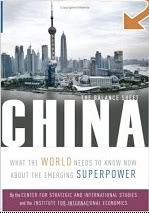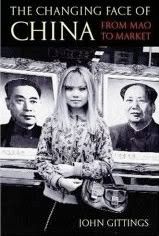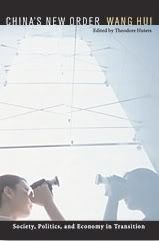Political reform : China will change in its own way
Wei-Wei Zhang
China is still widely depicted in the Western news media as a totalitarian state, and its economic success as economic reform without political reform. Yet any sharp break with the Communist economic system inevitably entails political change, and it is therefore far more accurate to describe the Chinese experience since 1978 as "great economic reform with lesser political reform."
The significance of China's economic miracle lies not only in the vastly improved living standards for the Chinese people, but also in its political implications. The reforms have dismantled the economic and institutional foundation of totalitarianism. With growing social mobility, the household registration (hukou) and personal dossier (dang-an) systems have been drastically loosened. With rising prosperity, the rationing system for consumer goods disappeared. Most people no longer depend for their livelihood on the state or their workplace (danwei), as most wealth and jobs today are generated outside the state sector.
The average person in China today has far more freedom of choice than at any time since 1949. Individuals can make their own choices of jobs, housing, school, marriage and leisure, and can move freely within the country or go abroad given the means.
This marks a monumental change for most Chinese from the days of Mao's total political control, and arises from the "lesser political reforms" that China has adopted since 1978.
First, mass ideological campaigns based on the Maoist doctrine of class struggle were repudiated, so that people could pursue their normal lives and material interests.
Second, virtually all political victims under Mao, numbering tens of millions, were rehabilitated, and their skills and overseas connections have been used for the benefit of China.
Third, across China's vast countryside, people's communes were abolished, thus ending this rigid political, economic and administrative system, which had impoverished Chinese farmers.
Fourth, village-level elections have been carried out in the Chinese countryside, which is a massive political experiment to introduce rudimentary democracy.
Fifth, other political reform experiments are being carried out, such as e-government and the practice of "small government and big society," which reduces bureaucracy and forsakes its many functions that can be better performed by society.
China's political reforms are essentially attempts to facilitate economic development, not democratization, and to improve the efficiency of the existing political system, not to abandon it. Such reforms have thus produced mixed results.
On the one hand, China has maintained political stability for more than two decades, during which its economy expanded ninefold, a level of growth unprecedented in Chinese history. On the other hand, this approach has sharply narrowed the scope of China's political reform and is far from adequate to tackle China's multiplying social, economic and political problems, ranging from growing regional gaps to mounting corruption, from weak legal institutions to various "economic bubbles."
China is now the largest laboratory of economic, social and political change in human history. A new consensus seems to be emerging within the Chinese leadership, headed by President Hu Jingtao and Prime Minister Wen Jiabao, that there should be a more substantial political reform to limit the power of bureaucrats, promote the rule of law and make the state more transparent and accountable to the people, eventually with more intra-party democracy and increased legal protection of individual rights vis-à-vis the state. A strong state is likely to be maintained, however, to ensure overall political and macroeconomic stability.
China's largely successful economic reforms may well have set a pattern for political change: a gradual, experimental and accumulative approach, moving from soft reforms to hard reforms, and assimilating whatever is good in Chinese and foreign ideas and experiences. After more than a century of devastating wars and chaotic revolutions, and after two decades of moderate and successful economic reforms, the Chinese seem more willing to embrace such gradual and even partial political reforms than revolution.
Developments that favor China's democratization include vastly improved living standards, an emerging civil society, the information and communication revolution, increased levels of education, an expanding middle class and non-state sector, extensive ties with the outside world, and recognition by the Party that it cannot and shall not micromanage Chinese society.
But full-fledged democratization may still be a long way off, for a number of reasons: the general perception of Deng Xiaoping's gradual reform as a success and Mikhail Gorbachev's radical change as a failure; inability of disaffected groups to organize themselves as a credible counter-force in China; the fear among the population that adversarial politics may cause an economic downturn and political chaos; and the absence of credible models for a large country like China to move out of authoritarianism. Indeed, the paralyzing experiences of Russia and Indonesia are discouraging, and the Indian model, however indispensable for India, is rarely attractive to the Chinese.
It makes sense for China — a huge country with little tradition of democracy and with a population larger than those of the United States, Europe, Russia and Japan put together — to act with both determination and discretion. The transformation of the Chinese state is inevitable, but it is likely to be gradual, pragmatic and accumulative, in much the same way as China's economic reforms unfolded.***
Wei-Wei Zhang, a senior research fellow at the Modern Asia Research Center, Geneva, is author of "Transforming China: Economic Reform and its Political Implications."
.
[Not to be reproduced without the permission of the author.]
Link
Read more!



